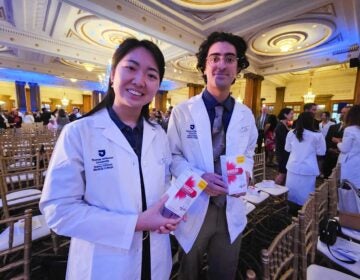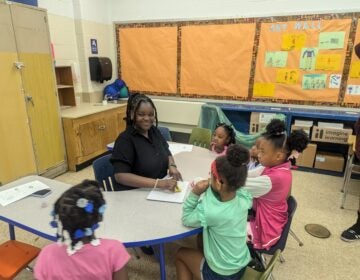Audrey Evans continues to inspire others beyond retirement
Before Philadelphia’s world-renowned oncologist and philanthropist Dr. Audrey Evans began a lifetime of research and compassionate care, her boarding school teachers accused her of dishonesty.
The British teenager would be at the library every three days, exchanging the books she devoured. But her teachers chose not to believe that one girl could have read all those books.
“They said I lied,” Evans, now 88, remembers indignantly from her Rittenhouse Square apartment, where she spoke last week with NewsWorks about her life and career.
Her father arrived for a meeting with the headmistress, who had to admit that Evans, despite being the youngest student, was in the top of her class.
“I would have loved to have been at that meeting,” Evans laughs now, as she reflects on a career and post-retirement accomplishments that have led to her latest honor, Philadelphia Magazine’s 13th annual Trailblazer Award.
The first first-aid kit
Growing up in York in the 1920s and ’30s, Evans had already chosen her career: “I always knew I was going to be a doctor.”
Perhaps it was the chronic bouts of tuberculosis, contracted from infected milk, which had her in and out of the hospital as a child.
Before she was ten years old, she was carrying a homemade first-aid kit with her everywhere, including a 2-oz bottle of Dettol antiseptic, a bandage and cotton balls.
“I didn’t often get a chance to use it, but I was quite prepared,” recalls Evans, who went on to attend the Royal College of Surgeons in Edinburgh.
A female doctor in a man’s world
In 1953, a Fulbright fellowship brought her to Boston Children’s Hospital for her residency, where she spent two years, followed by one year in pediatrics at Johns Hopkins. Upon returning to England, she knew she wanted to stay in pediatrics, but met discouragement. At the time, it was purely a hospital specialty – “and they explained of course it would be a man, so you wouldn’t have an opportunity to do pediatrics.”
Evans was no stranger to sexism. Serving three six-month residencies at the Royal Infirmary teaching hospital, she was barred from sharing her male colleagues’ conveniently located quarters: Evans couldn’t eat with the men, and had to fight for a place to sleep.
She was finally placed in a little two-bedroom “tower” at the top of a circular staircase in the residency – without a bathroom.
“So I had to go down in my dressing gown,” she says with a chuckle. “They took the locks off the doors, so I had to sing in the bath. So it was crazy. And it was wonderful too.”
‘Anything goes’ for children with cancer
A professional connection drew her back to Children’s Hospital in Boston as a senior resident on the oncology floor.
Under her mentor there, pathologist and leukemia pioneer Dr. Sidney Farber, Evans discovered her true passion: treating childhood cancer.
Evans speaks frankly about the heartbreak, tenderness and fortitude of those days.
Back then, “you couldn’t change the disease very much,” she admits. “It sounds like a terrible ward of kids, who probably have a fatal disease. And it wasn’t a horrible ward, because of the staff that ran it and the philosophy of ‘anything goes’.”
For example, “we had animals all over,” she says, remembering one boy dying of leukemia, comforted by his own pet bunny in the oxygen tent.
On the ward late one night, the famous Dr. Farber caught Evans with a hamster up her sleeve.
“As I’m saying goodnight to Dr. Farber…the hamster appears and sits on my shoulder. And what do you think Dr. Farber thought? I never knew.”
Evans is known for decades of ground-breaking research and a litany of prestigious career awards. Her advances in the diagnosis and treatment of neuroblastoma (a common childhood cancer that strikes before age five) contributed, by Evans’s estimate, to a 50 percent jump in survival rates. But in conversation, she focuses on the human anecdotes of her career.
“I lived outside the hospital, but sometimes I wouldn’t go home at night,” she remembers in the case of one child who, it turned out, had only hours to live.
“I was there at 4 a.m., talking to him – what would he like? And he wanted a piece of chocolate cake. OK. I call the dining room and I say I need a piece of chocolate cake, and I need it now.”
Coming to Philadelphia
Evans went to the helm of the hematology-oncology unit at University of Chicago Clinics in 1964, and arrived in Philadelphia four years later, chairing the cancer center at the Children’s Hospital of Philadelphia (CHOP) for 20 years.
Among her many advances in cancer care, the most famous is the Evans Staging System for Neuroblastoma, first developed in the early 1970s, which determines optimal treatments based on how far the disease has progressed.
The ‘total care’ philosophy
Early on, with the help of Dr. Farber in Boston, Evans absorbed a philosophy of “integrated” care that would guide her whole career.
“When he came to rounds, the head nurse and the clinic nurse and the social worker were all there, feeling quite able to have their say,” she explains. In this “total care” concept, “a sick child makes a sick family, and you have to take care of everybody.”
Evans founded the original Ronald McDonald house in Philadelphia in 1974, a resource and residential haven for the families of sick children, now replicated over three hundred times worldwide.
She retired as CHOP’s Oncology chair in 1989, but continued her work in the lab, developing new treatments for neuroblastoma for another two decades.
She recently entered a new personal phase, marrying her longtime colleague, radiation oncologist Dr. Giulio J. D’Angio, at age 80.
“We got married at 7:30 in the morning, we went across the street and had coffee and croissants, and we were at work at 8:30,” she says.
Making a difference at any age
But when Evans retired from the lab a few years ago, she says she developed a “crashing depression.”
“It was awful,” she said. “I didn’t know who I was or what I was supposed to do.”
So she dedicated herself to co-founding the St. James School, in the Hunting Park section of Philadelphia, through her longtime membership with the sponsoring St. Mark’s Episcopal Church.
Serving some of the city’s most disadvantaged children as well as their families, Evans says St. James School continues to embody the “total care” philosophy that was the mainstay of her medical career.
“Good education is the way you get along in the world,” she says, citing the “deadly statistics” of poverty in America. But for the students’ families, the school’s immersive programming is about more than academics.
“What they need to have is ordinary life, if we know that it’s missing, we’ll try and put it there,” Evans explains, pointing to donations of everything from food to furniture.
Despite a lifetime of awards and a revolution in oncology, Evans is content with a simple legacy as “a woman who cared. That’s enough.”
Editor’s note: A previous version of this story stated that the original Ronald McDonald house was founded in Philadelphia in 1984. While the Ronald McDonald House Charities weren’t officially established until 1984, the first house was founded in 1974. We’ve corrected the copy to clarify this.
WHYY is your source for fact-based, in-depth journalism and information. As a nonprofit organization, we rely on financial support from readers like you. Please give today.




